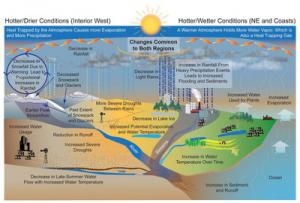WaterExperts urge negotiators to include water in climate agreement
The impact of climate change is felt through water, with flooding, erratic rain patterns, prolonged droughts, and other extreme weather events. Water is also critical for successful climate change mitigation, as many efforts to reduce greenhouse gas emissions depend on reliable access to water resources. World Water Week closed on Friday in Stockholm, with the Stockholm International Water Institute (SIWI) urging climate negotiators to ensure that water is integrated in the global 2015 climate agreement.

Concept art of warming impact on water // Source: epa.gov
World Water Week closed on Friday in Stockholm, with the Stockholm International Water Institute (SIWI) urging climate negotiators to ensure that water is integrated in the global 2015 climate agreement.
This year, World Water Week – with the theme Water for Development — had 3,300 participants from 125 countries, representing governments, academia, civil society, international organizations, the private sector, and many others. Both World Water Week and Stockholm Water Prize celebrated their twenty-fifh jubilee.
SIWI’s executive director Torgny Holmgren summarized the participants’ sentiment when he said: “water is what binds together all the aspects of climate change. Climate change is water change.”
SIWI notes that the impact of climate change is felt through water, with flooding, erratic rain patterns, prolonged droughts, and other extreme weather events. Water is also critical for successful climate change mitigation, as many efforts to reduce greenhouse gas emissions depend on reliable access to water resources.
“It is absolutely vital that water is a part of both voluntary initiatives to mitigate and adapt to climate change, as well as of the Climate Convention itself,” said Karin Lexén, director of World Water Week, International Processes and Prizes.
Sweden’s minister for climate and environment and deputy prime minister, Dr. Åsa Romson, echoed SIWI’s message: “If waters are not managed properly and water resources management is not well integrated in climate efforts, climate impacts will have a significant effect on our societies — it is a challenge for all countries.”
She added that “I want to encourage further discussions on how to strengthen water resilience as part of the Action agenda and to make sure that climate investments, including through the Green Climate Fund, can support water resilience.”
Dr. Benedito Braga, secretary of state for sanitation and water resources for the state of São Paulo in Brazil and president of the World Water Council, said that “Water security is probably the greatest human challenge of this century.”
Struggling with extreme water shortages in a metropolitan area serving over twenty million people, he added: “Today I strongly believe that the stakes are higher than ever.”
In a passionate plea to negotiators in Paris, the president of Marshall Islands, Christopher J. Loeak, earlier in the week said he was not sure if he dared hope for the strongest possible wording in the climate agreement, but said he expected the world to make a historic pledge that would not only save his country, but also the world.
“We (Marshall Islands) are quite literally contemplating a future where we are being wiped off the world map,” he said.
“It is of utmost importance to integrate and address water in the global climate discourse and this World Water Week has been an important platform for such collaborative discussions towards Paris,” Minister Åsa Romson concluded.
Prizes
During the Week, several prizes were awarded for excellence in water-related issues. The Stockholm Industry Water Award was awarded to the engineering company CH2M for developing and advancing methods to clean water, and increasing public acceptance of recycled water. Perry Alagappan from the United States received the 2015 Stockholm Junior Water Prize for inventing a filter through which toxic heavy metals from electronic waste can be removed from water. The prestigious Stockholm Water Prize was awarded to Rajendra Singh of India, for his innovative water restoration efforts, improving water security in rural India, and for showing extraordinary courage and determination in his quest to improve the living conditions for those most in need.
